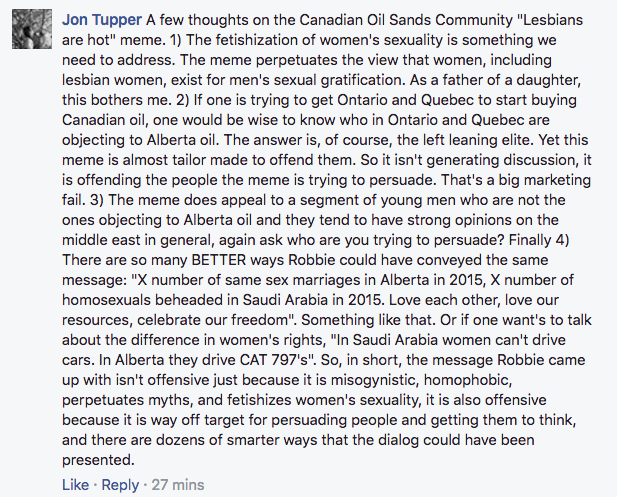This Ad Shows Exactly How You Shouldn't Talk About Lesbians

By:
A poster supporting Canadian oil caused controversy for its depiction of "hot" lesbians. Although many people may not automatically associate lesbians and subterranean natural resources, the Canada Oil Sands Community apparently thought that lesbians would be a great marketing tool to promote Canadian oil over foreign oil from the Middle East.
The ad questions why Canadians are buying oil from a homophobic country like Saudi Arabia.
"In Canada, lesbians are considered hot! In Saudi Arabia if you're a lesbian, you die! Why are we getting our oil from countries that don't think lesbians are hot?! Choose equality! Choose Canadian oil!"
Although the unique marketing campaign seemed to attempt a pro-LGBT message, many people called the ad's depiction of stereotypical "hot" lesbians offensive.
 Facebook/Canada Oil Sands Community - facebook.com
Facebook/Canada Oil Sands Community - facebook.com
 Facebook/Canada Oil Sands
Facebook/Canada Oil Sands
 Facebook/Canada Oil Sands Community - facebook.com
Facebook/Canada Oil Sands Community - facebook.com
Canada Oil Sands Community pulled the ad and wrote an apology, saying that the ad's intent was not in "demeaning women or any people of any sexual orientation."
"It was rather to highlight injustice done by other countries we are purchasing our oil from," said the post.
Facebook users pointed out that the ad is misogynistic because it's using women as objects, and it's also overlooking real solutions to the struggles LGBT people face around the world.
 Facebook/Canada Oil Sands Community - facebook.com
Facebook/Canada Oil Sands Community - facebook.com
 Facebook/Canada Oil Sands Community - facebook.com
Facebook/Canada Oil Sands Community - facebook.com
 Facebook/Canada Oil Sands Community - facebook.com
Facebook/Canada Oil Sands Community - facebook.com
Many users pointed out that the poster's objectification of two "hot" lesbians kissing appeals to the "male gaze," a term developed by film theorist Laura Mulvey in 1975. The theory refers to media depictions of women in pop culture that are created specifically for straight men's sexual fantasies and desires. In her essay "Visual Pleasure and Narrative Cinema," Mulvey wrote that women are often depicted as sex objects in film because the movies are made by straight male directors.
While media that objectifies women is still out there, some organizations are fighting back. Back in February, The Representation Project called out sexist Superbowl ads with the hashtags #NotBuyingIt and #MediaWeLike. The campaign encouraged people to talk about ads that sexualize women and break down gender stereotypes.
